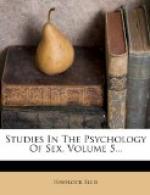[127] With regard to the relationship of detumescence to the blood-pressure Haig remarks: “I think that as the sexual act produces low and falling blood-pressure, it will of necessity relieve conditions which are due to high and rising blood-pressure, such, for instance, as mental depression and bad temper; and, unless my observation deceives me, we have here a connection between conditions of high blood-pressure, with mental and bodily depression, and the act of masturbation, for this act will relieve those conditions, and will tend to be practiced for this purpose.” (A. Haig, Uric Acid, sixth edition, p. 154.)
[128] A medical correspondent speaks of subjective feelings of temperature coming over the body from 20 to 24 hours after congress, and marked by sensations of cooling of body and glow of cheeks. In another case, though lassitude appears on the second day after congress, the first day after is marked by a notable increase in mental and physical activity.
III.
The Constituents of Semen—Function of the
Prostate—The Properties of
Semen—Aphrodisiacs—Alcohol,
Opium, etc.—Anaphrodisiacs—The
Stimulant
Influence of Semen in Coitus—The Internal
Effects of Testicular
Secretions—The Influence of Ovarian Secretion.
The germ cell never comes into the sphere of consciousness and cannot therefore concern us in the psychological study of the phenomena of the sexual instinct. But it is otherwise with the sperm cell, and the seminal fluid has a relationship, both direct and indirect, to psychic phenomena which it is now necessary to discuss.
While the spermatozoa are formed in the glandular tissue of the testes, the seminal fluid as finally emitted in detumescence is not a purely testicular product, but is formed by mixture with the fluids poured out at or before detumescence by various glands which open into the urethra, and notably the prostate.[129] This is a purely sexual gland, which in animals only becomes large and active during the breeding season, and may even be hardly distinguishable at other times; moreover, if the testes are removed in infancy, the prostate remains rudimentary, so that during recent years removal of the testes has been widely advocated and practiced for that hypertrophy of the prostate which is sometimes a distressing ailment of old age. It is the prostatic fluid, according to Fuerbringer, which imparts its characteristic odor to semen. It appears, however, to be the main function of the prostatic fluid to arouse and maintain the motility of the spermatozoa; before meeting the prostatic fluid the spermatozoa are motionless; that fluid seems to furnish a thinner medium in which they for the first time gain their full vitality.[130]




